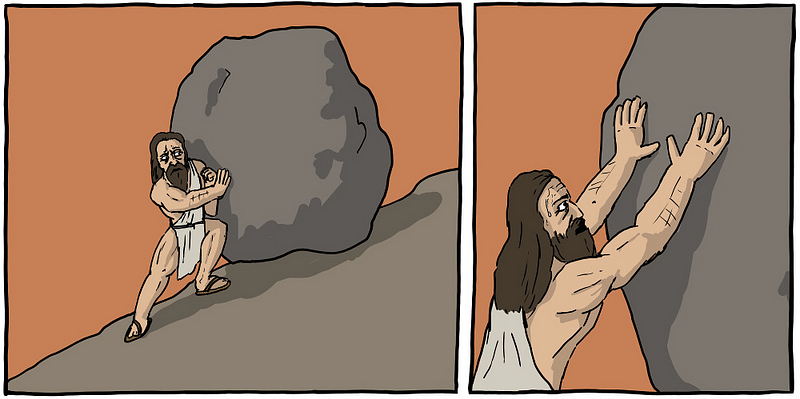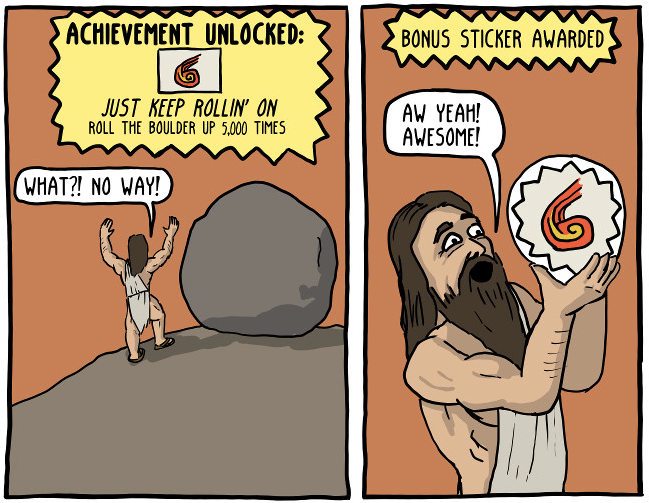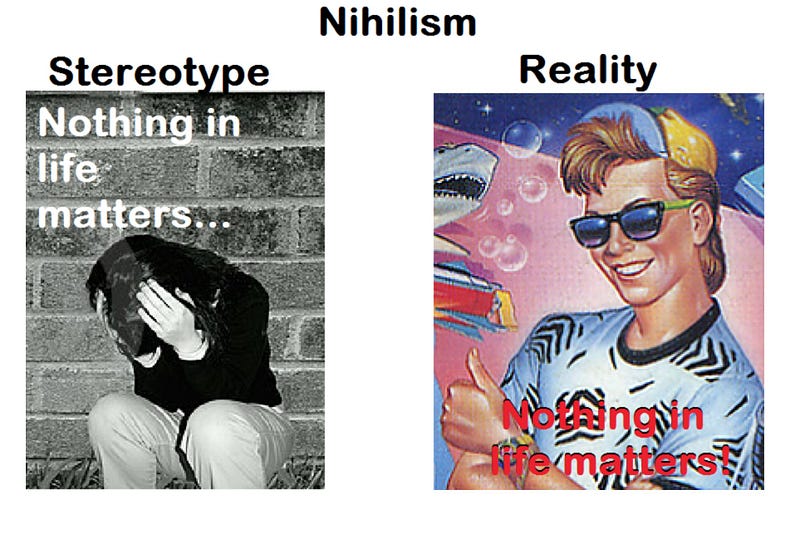
Life, particularly in modern civilization, is an absurd circus. We’re all clowns living in boxes trying to amuse ourselves with elaborate games in the face of inevitable death and meaninglessness.
What’s additionally absurd is that we go through a lot of trouble to avoid facing up to this fact. We avoid discussing it with children because we don’t want to scare or frighten them. We avoid discussing it with our families at the dinner table because it seems rude or impolite. [1] And most of us, it seems, just keep avoiding it at all costs. [2]
Well, Albert Camus wanted to discuss it. He wrote an essay titled The Myth Of Sisyphus, about a wise, prudent mortal condemned by the Gods to the most miserable of punishments — futile, hopeless, meaningless labor. He was cursed to roll a large stone up a hill, have it roll back down, and repeat the process for eternity.
Camus uses quite a few words to make a subtle point :
“If this myth is tragic, that is because its hero is conscious. Where would his torture be, indeed, if at every step the hope of succeeding upheld him?”, and “The workman of today works everyday in his life at the same tasks, and his fate is no less absurd. But it is tragic only at the rare moments when it becomes conscious.”
I agree with all of that. Being aware of futility is torturous, which is why we avoid it as much as we do.
Camus then goes on to try to make the case that Sisyphus should be HAPPY.
And this is where I think it devolves into wishful thinking.
“All Sisyphus’ silent joy is contained therein. His fate belongs to him.”
Really? It doesn’t quite persuade me. I think Camus was getting a bit romantic and prescriptive here. It’s equally valid to say that his fate belongs to the Gods, after all.
The essay ends with “The struggle itself toward the heights is enough to fill a man’s heart. One must imagine Sisyphus happy.”
This statement is prescriptive, not descriptive. Camus is saying that WE should imagine Sisyphus happy, for the sake of our own emotional and psychological well-being.

Existential Comics riffs off this idea amusingly by introducing gamification. In their take, Sisyphus enjoys his meaningless task once meaningless numbers and trinkets are added to the game.
I think this accurately captures how most humans deal with the meaninglessness of reality in practice [3], but I don’t think that’s exactly what Camus was trying to prescribe. I think Camus was trying to explore a question that he supposedly raised elsewhere– “should I kill myself or have a cup of coffee?“. He was trying to say that Sisyphus must be imagined intrinsically happy.
And that we, by extension, should imagine ourselves happy with our absurd, futile lives.
If we go back to the Myth of Sisyphus essay, we see more clearly that the honors, gamifications, epaulettes – all of that is distraction from the awareness of the fundamental absurdity of human existence.
If Sisyphus enjoys the stickers and stats on his stone, as Existential Comics suggests he might, then he’s (probably) distracting himself from the absurdity of his situation. [4] Good for him, maybe.
But the fact that Camus sat down to write the essay he wrote suggests that he didn’t think distraction sufficed. (For if he did, it would follow that he would’ve stopped worrying about the problem of absurdity and just distract himself with other things!)
So it’s clear to me that Camus thought we ought to imagine ourselves happy despite being aware of the futility of existence.
Happiness is a trap
Here’s what I think: I think that happiness is too much to ask for. I think happiness is a by-product, it’s something that’s realized rather than pursued. [5] I think wanting to be happy all the time, trying to be happy all the time– I think that’s a sort of madness. It’s a very unfair, unrealistic expectation to have, and it guarantees dissatisfaction. A full, rich life would have all sorts of experiences and emotions associated with it. Sometimes we’re happy and sometimes we’re sad, and the sadness is every bit as important as the happiness.
If we’re perpetually sad all the time, we might want to ask why that is, and whether we’re okay with that. If we’re not okay with that, then we might want to do something about it– change the setting, change the frame.
Amusement as a weapon
I can’t remember who was it where I first encountered the idea– it might’ve been Elon Musk or some writer or otherwise ambitious or entrepreneurial person– someone who said that happiness is subtle, fleeting and difficult to pin down, and it’s much better to navigate by excitement.
If you’re unhappy (maybe because you’re having a bad day, or a rough time, or you’re tired), but you’re excited about something, then you’re probably doing alright. If you’re happy, but you’re not excited about something, chances are your happiness will fade sooner or later. It’s more complex than that, of course, but the point is that if you have something to look forward to, then life becomes less of an ordeal.
Parallel to that, I’ve come to believe that the only enduring, sustainable response to absurdity is humor. To be reductive about it, either we laugh or we cry, isn’t it? Either it’s a tragedy or a comedy. And finding humor in something is incredibly powerful. If you can laugh after tremendous loss and suffering, after experiencing grave trauma and whatnot, then I believe that you’ll be okay. I mean, you’re going to DIE (sorry), and everything is ultimately meaningless, so you’ll eventually cease to BE at all. But if you can still laugh, then you’ve still got a chance to enjoy the life you have left– even if it’s painful, difficult, unfair, miserable and so on.
I’m not saying we should allow ourselves to be miserable, or that we shouldn’t work to correct injustice, or that this justifies suffering. We should reduce suffering wherever we can. But suffering is an unlimited, renewable resource, so there will always be more of it down the road. Like the man cursed by the Gods, we will always be suffering.
One must imagine Sisyphus LOL-ing.
_____
Footnotes:
[1] A person could go through their entire life from cradle to grave without ever really thinking very much about how ridiculous life is, or how and why he does what he does, towards what end, for what purpose, in what greater context. Religions are convenient here, and remove a lot of the difficult thinking and grappling required.
[2] Louis CK has a great bit about this, about how we avoid pain and sadness by distracting ourselves.
[3] Steve Yegge wrote a great essay about gun collecting and token economies in Borderlands that applies here, and Richard Feynman spoke similarly about honors and epaulettes
[4] Caveat: It’s possible to simultaneously enjoy the game AND recognize that it’s only a game, ultimately illusory. Alan Watts talked a lot about that. A lot of people choose to do just one or the other– either throw yourself into the pleasures and riches and pursuits of material existence, or try to forsake and abandon all of it altogether through a life of asceticism. The latter can itself become a sort of attachment to an ideal– the pursuit of a spiritual goodie rather than a material goodie.
[5] And there are many parts to happiness– fulfillment, meaning, flow, pleasure. Each of those things have different variables that influence it.
[6] Here’s a picture, just for fun: